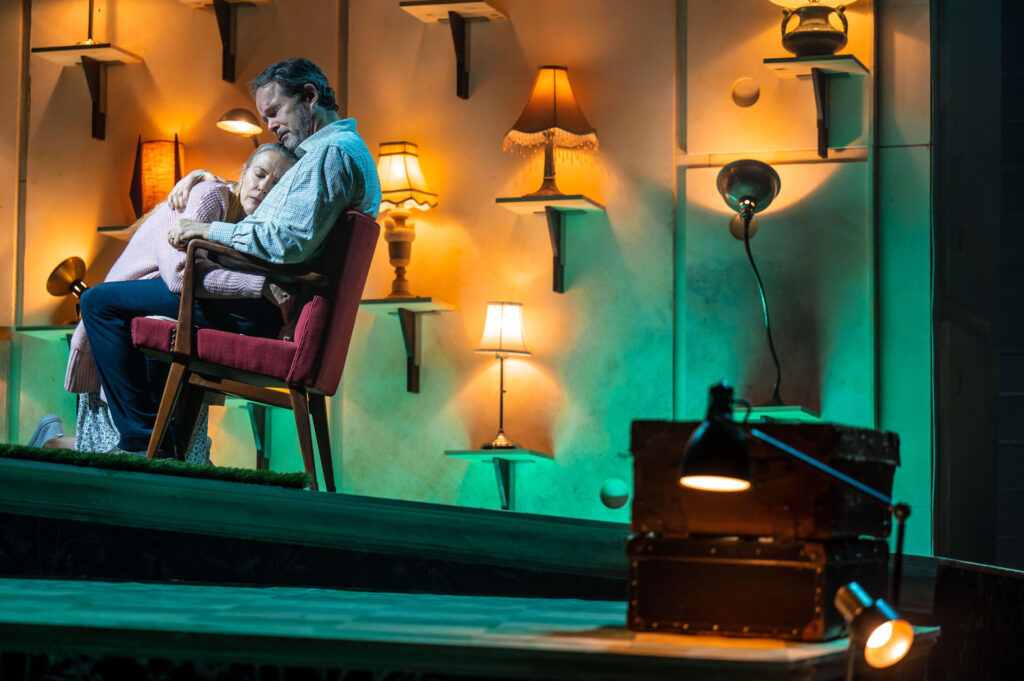There is no gloomy, foreboding castle. No locked doors to open.
A slinky orange kimono stands in for a collection of intense instruments of torture.
A vintage military greatcoat supplants an arsenal of arms and armour.
A wedding veil substitutes for gold and gems.
Old baby clothes and a teddy bear instead of a glorious flower garden.
A pair of Christmas stockings replace a vast shining landscape.
A tightly folded schoolboy’s uniform fills in for a sea of tears.
An antique mirror rather than the ghosts of former wives.
Bluebeard’s Castle, a new intimate iteration from West End London’s Theatre of Sound transplanted to Toronto’s lakeside Fleck Dance Theatre, brims with metaphor, Hungarian symbolist Béla Bartók’s early 20th century psychodrama sharply transposed from murky gothic horror tale to excruciatingly personalized human tragedy. Keenly translated and directed by Daisy Evans, Bartók’s searing symphonic score sensitively rearranged by conductor Stephen Higgins, this harrowing portrait of a present-day marriage savaged by dementia speaks with profound eloquence of the human impulse both to love and survive.
Evans’ treatment of Bartók’s harrowing one-act opera — a comprehensive updating in terms of action and scenography— tears at the emotions. English is a challenging language to frame extended operatic conceits, but somehow this startling, disturbingly edgy perspective on originating librettist Béla Balázs fevered text succeeds, essentially retaining the heart and soul of Bluebeard’s Castle as first performed. Meaning flows from fresh insight into the poetry, Evans leading us on a journey from shadow to darkness and ultimately to a place of immense compassion.
Evening. A cramped, worn-out lounge in a lonely bed sitting room. A man, cryptically known only as Bluebeard, returns home with his wife, Judith. She is clearly confused and in a state of considerable distress. A palpable sense of displacement further deepens the already tense atmosphere. Two large, battered old suitcases occupy a place of prominence on the floor nearby. “Secrets I’ve been hiding,” Bluebeard explains. Puzzled, Judith tentatively opens one, overcome with curiosity. Time beats on. The story unfolds. One by one, seven artifacts emerge, each triggering clouded recollections of a precious past dimmed by dementia. Panicked and bewildered, Judith battles for understanding. Reason steadily retreats. Memories appear as avatars, three aspects of the woman Bluebeard has always cherished, each loved and lost, each enshrined in time, treasured keepsakes keys to vanished flights of reverie. “When the final one is open, there you will find my wife waiting.” Judith removes a mirror. Silent, still, she stares at her reflection, trapped in her mind. Lights fade to black.
Time stops.
Original art design, faithfully transposed to Toronto in its entirety by sponsoring producer Against the Grain Theatre, glowingly illuminates narrative intentions here with brilliant allegorical lighting by Jake Wiltshire, telling set and costumes by Adrian Linford.
Singing the title role of Bluebeard, world baritone Gerald Finley offers inconvertible proof of his command of the international opera stage as one of music theatre’s finest, most generous singing actors. Nothing is withheld. Pain and anguish, intimacy and caring pour from his character in waves of soaring head voice, breathlessly segueing to mellower, more tranquil moments of gorgeous legato.
Swedish mezzo-soprano Charlotte Hellekant appears as Judith, a “heroic” performance as Finley noted in a post performance Q & A given the Harbourfront production’s mere 8-day rehearsal schedule. Confronted with towering dramatic demands, occasional lapses in diction understandable, Hellekant whole-heartedly commits to the enormous emotional demands of the role, her voice silvery and sleek and utterly riveting.
Non-speaking, non-singing roles are all uniformly well-handled. Alexis Celestine Wilson, Jamaica Fraser and Josée Young appear as various manifestations of Judith at differing times of her life as recalled by Bluebeard. Bryony Faye Fowler and Cody Black are the couple’s vivacious daughter and dead son respectively.
Leading an excellent 7-piece chamber ensemble — violin, viola, cello, horn, clarinet, bass clarinet and keyboards — Stephen Higgins summons a rich palette of warmth and colour, effectively paraphrasing Bartók orchestrally with great intelligence and skill.
Bluebeard’s Castle is extraordinary. It must be visited.


